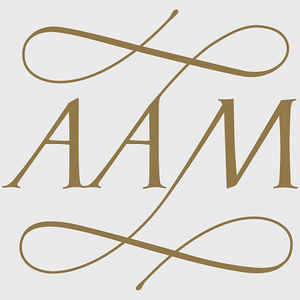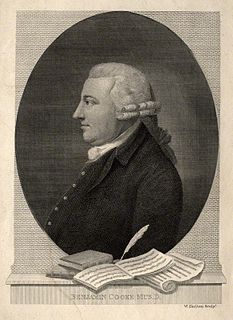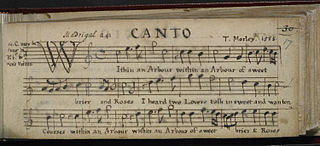
The Beggar's Opera is a ballad opera in three acts written in 1728 by John Gay with music arranged by Johann Christoph Pepusch. It is one of the watershed plays in Augustan drama and is the only example of the once thriving genre of satirical ballad opera to remain popular today. Ballad operas were satiric musical plays that used some of the conventions of opera, but without recitative. The lyrics of the airs in the piece are set to popular broadsheet ballads, opera arias, church hymns and folk tunes of the time.

The Academy of Ancient Music (AAM) is a period-instrument orchestra based in Cambridge, England. Founded by harpsichordist Christopher Hogwood in 1973, it was named after a previous organisation of the same name of the 18th century. The musicians play on either original instruments or modern copies of instruments from the period of time the music was composed. They generally play Baroque and Classical music, though they have also played some new compositions for baroque orchestra in recent years.
The year 1710 in music involved some significant musical events and new works.

Benjamin Cooke was an English composer, organist and teacher.
John Travers was an English composer who held the office of Organist to the Chapel Royal from 1737 to 1758. Before filling several parochial posts in London he had been a choir boy at St. George's Chapel, Windsor and a pupil of Johann Christoph Pepusch.
The year 1667 in music involved some significant events.
James Hamilton, 7th Earl of Abercorn, styled Lord Paisley from 1701 to 1734, was a Scottish and Irish nobleman and peer. An amateur scientist and musician, he published a book on magnetism in 1729 and a treatise on musical harmony in 1730, which was subsequently emended and re-issued by his teacher, Dr. Pepusch.
The Royal Society of Musicians of Great Britain is a charity in the United Kingdom that supports musicians. It is the oldest music-related charity in Great Britain, founded in 1738 as the "Fund for Decay'd Musicians" by a declaration of trust signed by 228 musicians, including Edward Purcell, Thomas Arne, William Boyce, Johann Christoph Pepusch, Dr. John Worgan, and George Frideric Handel. It still operates a bank account at Drummonds Bank which was opened by its first secretary, Michael Christian Festing, in November 1738.

John Immyns was an English attorney, lutenist, and prolific copyist.
In music a voluntary is a piece of music, usually for an organ, that is played as part of a church service. In English-speaking countries, the music played before and after the service is often called a 'voluntary', whether or not it is titled so.
Polly is a female given name.
Anthony Young was an English organist and composer. He was part of a well-known English family of musicians that included several professional singers and organists during the 17th and 18th centuries.
George Frideric Handel was the house composer at Cannons from August 1717 until February 1719. The Chandos Anthems and other important works by Handel were conceived, written or first performed at Cannons.
Félix Rienth is a Swiss operatic tenor. Born in Basel, he was a member of the Basel Boys Choir in his youth. He made his first opera appearance as a boy with Theater Basel as the first boy in Wolfgang Amadeus Mozart's The Magic Flute. He attended the University of Basel where he earned diplomas in the Spanish and German languages. He then studied singing privately in Basel with Heidi Wölnerhanssen before entering the Hochschule der Künste Bern; graduating from there in 2000 with a degree in opera performance. He has since had a major career as a concert singer in the oratorio repertoire; appearing with important ensembles and at major music festivals throughout Europe, including a recital in presence of Her Majesty, Queen Fabiola of Belgium. He has made about 20 recordings on a variety of labels. A highly acclaimed production was the recording of Johann Christoph Pepusch]]'s "Tenor Cantatas" with his wife, Muriel Rochat Rienth, recorder player, and Swiss baroque ensemble "La Tempesta Basel". His CD of Spanish baroque songs "Tonos humanos" by José Marín was considered as a reference recording by German magazine "Klassik heute". 2014 is appearing Georg Philipp Telemann's "Tenor Cantatas" with "La Tempesta Basel", elected among "Best CDs of the month" by Spanish magazine RITMO.
Jane Barbier was an English contralto of the 18th century, best known for her performances in the operas of George Frideric Handel. She created the roles of Dorinda and Arcano, and also sang in Rinaldo. After leaving Italian opera she performed in the masques of Johann Pepusch, and worked for John Rich in various pantomimes and English-language operas. Thomas Arne's Rosamond (1733), where she took the role of King Henry, marked the end of her successful career, and after this she largely disappears from the historical record.

Margherita de L'Epine was an Italian soprano of the Baroque era. She was among the most popular and successful of London's female singers in the years just before and after Italian opera became introduced to the city. Today, she is best remembered for her performances in the operas of George Frideric Handel, and her longstanding association with the composer Johann Pepusch, whom it seems she married around 1718.
This is a list of the operas performed by Glyndebourne Festival Opera during the music directorship (1934-1951) of Fritz Busch. Operas performed at venues other than Glyndebourne by Glyndebourne forces are also included, as are operas performed at Glyndebourne by other companies.

Chandos Anthems, HWV 246–256, is the common name of a collection of eleven anthems, sacred choral compositions written by George Frideric Handel, with the authorship of No. 12 being debated. The texts are psalms and combined psalm verses in English. Handel wrote the anthems as composer in residence at Cannons, court of James Brydges who became the First Duke of Chandos in 1719. His chapel was not yet finished, therefore services were held at St Lawrence in Whitchurch. The scoring is intimate, in keeping with the possibilities there. Some of the anthems rely on earlier works, and some were later revised for other purposes.






